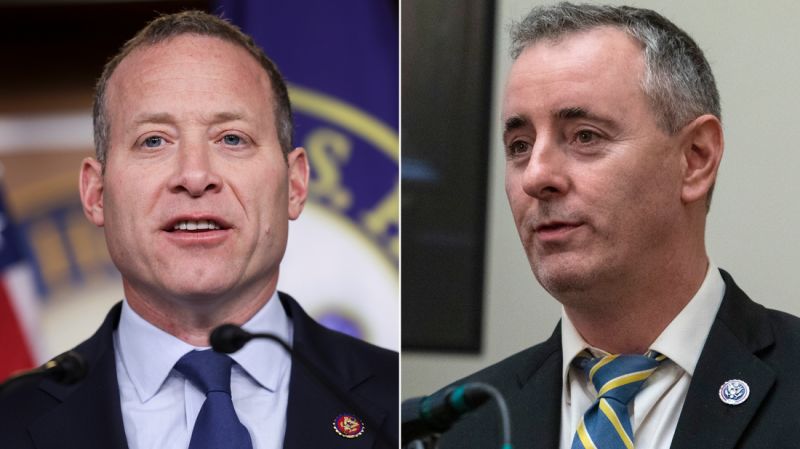Main Topic: Congress likely to pass a short-term government funding bill to avoid a shutdown this fall.
Key Points:
1. Speaker Kevin McCarthy believes a short-term funding bill is necessary due to lack of time for a full-year funding deal.
2. The length of the stopgap bill and policy terms still need to be agreed upon by congressional leaders.
3. The House and Senate are moving in different directions on appropriations, with the House seeking spending cuts and conservative policy provisions, while the Senate aims for bipartisan support and avoids controversial provisions.
The far-right House Freedom Caucus is poised to cause a government shutdown at the end of September by insisting on unlikely provisions in exchange for its votes to fund the government.
House GOP leaders are considering avoiding a government shutdown by approving a short-term continuing resolution instead of a massive bill to fund the Pentagon, as they face demands from hardliners for deeper spending cuts and specific funding levels.
The fight over how to avoid a government shutdown has caused fractures within the House GOP majority, with disagreements on whether a stopgap spending bill should be passed, leading to the cancellation of a procedural vote on the bill.
Some swing district Republican lawmakers are considering working with Democrats to avert or shorten a government shutdown by utilizing a procedural step known as a "discharge petition" to force a vote on a clean spending bill.
Two freshman GOP members, Rep. Marc Molinaro and Rep. Mike Lawler, have expressed a willingness to work with Democrats and pursue a "discharge petition" to force votes on short-term funding if their party fails to pass a continuing resolution, potentially breaking with Speaker Kevin McCarthy and causing a rift within the Republican Party.
Warring factions within the Republican Party in the U.S. Congress have shown no signs of coming together to pass a stopgap funding bill, raising concerns of a government shutdown.
GOP lawmaker Rep. Brian Fitzpatrick discusses the efforts of the Problem Solvers Caucus in preventing a government shutdown.
Lawmakers are facing a tight deadline to reach an agreement on a budget resolution to avoid a government shutdown as spending laws are set to expire on September 30. House Republicans, led by Speaker Kevin McCarthy, are struggling to unite the GOP caucus and secure enough votes for a deal, while Democratic support would come with political consequences. Failure to reach an agreement would result in paused paychecks for federal employees and disruption of government services.
Senate leaders are expected to unveil a short-term government funding stopgap measure that will be clean and not contain significant amounts of money for the war in Ukraine or disaster relief, aiming to avoid a government shutdown at the end of the week.
Senate Republicans and Democrats have reached an agreement on a stopgap spending plan to prevent a government shutdown, but it faces resistance in the Republican-led House due to opposition to aid for Ukraine and maintaining federal funding at current levels.
Senate leaders are taking control to avoid a government shutdown by advancing a stopgap funding bill, pressuring House Speaker Kevin McCarthy to bring it to the House floor for a vote.
Opponents of a Senate stopgap measure are delaying a vote, making a government shutdown increasingly likely as the midnight Sunday deadline approaches.
House Minority Leader Hakeem Jeffries is considering using a discharge petition to force a short-term spending bill, known as a continuing resolution (CR), onto the House floor in order to avoid a government shutdown, but he is skeptical of moderate Republicans joining the effort.
House Republicans are frustrated and without a clear plan to avert a government shutdown as the deadline for funding runs out today, with no agreement in sight.
House Republicans are in a funding standoff that may lead to a government shutdown, with House Speaker Kevin McCarthy proposing a stopgap funding bill and facing threats from within his own party.
The House of Representatives passes a 45-day stopgap spending bill in a bipartisan vote, as the U.S. government is approaching a potential massive shutdown.
President Joe Biden signed a stopgap bill into law to avert a government shutdown, preventing a crisis that would have affected millions of Americans, while criticizing House Republicans for the last-minute scramble.
Congress passed a stopgap funding bill to keep the government open through mid-November, avoiding a shutdown that would have had devastating effects, allowing federal workers to continue receiving pay and preventing disruptions to air travel and relief efforts in the wake of natural disasters.
Lawmakers avoided a government shutdown by passing a 47-day stopgap funding measure, but will need to find a solution by November 17th to prevent a Thanksgiving shutdown, while House Speaker Kevin McCarthy faces threats to his position and potential removal from Rep. Matt Gaetz.
Republican House speaker nominee Jim Jordan has proposed passing a stopgap bill to prevent a government shutdown, utilizing automatic cuts as leverage over Democrats, although some Republicans are skeptical of the plan.
